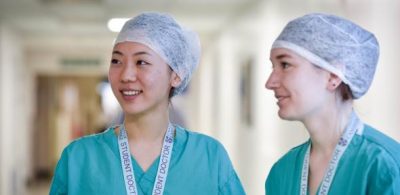Subject requirements
British System
A-Level:
- Grade: A*A*A
- Subject: A Levels in Chemistry and one of Biology, Physics, Mathematics.
Most applicants for Medicine at Cambridge have at least three science/mathematics A Levels and some Colleges require this and/or particular subjects. - Please note, 'Science/mathematics subjects’ refers to Biology, Chemistry, Physics, Mathematics and Further Mathematics. It does not include Psychology.
International Baccalaureate
- Point: 40-42 points, with 776 at Higher Level
- Subject: Higher Levels in Chemistry and one of Biology, Physics, Mathematics.
- Competitive applications typically have Higher Levels in two science subjects and Maths. Some Colleges require this and/or particular subjects.
- If taking Maths at Higher Level we recommend Analysis and Approaches for the most competitive application, however Applications and Interpretations will also be considered.
Admission Assessment
Standard Course (A100) applicants, including mature College applicants, must take the Biomedical Admission Test (BMAT) at an authorized assessment center, which is typically your school or college. Prior registration is necessary.
While applicants are generally not required to submit written work examples, a few may receive requests from their College to complete preparatory reading ahead of their interviews. In such cases, the College will provide comprehensive instructions in the interview invitation letter.
Graduate Entry
Graduates are eligible to apply for the Standard Course (A100) as affiliated students at Lucy Cavendish, St Edmund’s, or Wolfson Colleges if they meet the following criteria:
- Hold a good Honours degree (2.1 or above) in any discipline.
- Possess A Level passes (or equivalent qualifications), as mentioned above.
Affiliated students undertake a five-year course, transitioning from Year 2 to clinical studies upon admission.
Applicants to the accelerated Graduate Course in Medicine (A101) at Lucy Cavendish, Hughes Hall, St Edmund’s, or Wolfson Colleges should hold a strong academic record. Graduates from any discipline are eligible, provided they meet the following criteria:
- If you are yet to complete your first degree or graduated with a 2.1, you should aim for at least AAA in your A-levels.
- If you have already graduated with a 1st class degree, achieving ABB in your A-levels is sufficient.
Additionally, you should have completed A Level Chemistry or an equivalent qualification within seven years of your intended entry. We also consider results from equivalent qualifications or grading structures from other universities.
It's important to note that this course is exclusively available to Home fee status students. Furthermore, it's worth mentioning that graduate medical students, regardless of their undergraduate background in arts or humanities or biomedical sciences, perform equally well in the course.
English Language Requirement
Applicant must submit one of the following English Proficiency Scores:
- IELTS Academic – normally a minimum overall grade of 7.5, usually with 7.0 or above in each element
- TOEFL Internet Based Test (IBT) – normally a minimum overall score of 110, with 25 or above in each element
- EU students – competence in English at C1 standard in the appropriate component of a school-leaving exam (for example, the Abitur)
- Cambridge English: C2 Proficiency – accepted with a minimum overall score of 200, with no element lower than 185
- Cambridge English: C1 Advanced – accepted with a minimum overall score of 193, with no element lower than 185, alongside other evidence of competence in English
- Other accepted qualifications
International student quota
Please note that only 22 places are available each year for overseas fee status students.
Work Experience
To gain insight into the field of Medicine and assess your suitability for this profession, we recommend undertaking relevant work experience in healthcare or social care settings. The nature of this experience, whether paid or voluntary, can vary widely, and University of Cambridge do not prescribe specific methods for obtaining it.


